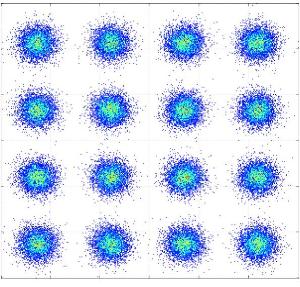Dec 22 2014
Researchers from the University of Southampton have revealed a breakthrough in optical fibre communications.
 This is a constellation diagram of one of the mainstream modulation formats of the future system: Sixteen Quadrature-Amplitude modulation. (University of Southampton)
This is a constellation diagram of one of the mainstream modulation formats of the future system: Sixteen Quadrature-Amplitude modulation. (University of Southampton)
Academics from the University's Optoelectronics Research Centre (ORC) have collaborated with colleagues at Eblana Photonics Inc, in Ireland, to develop an approach that enables direct modulation of laser currents to be used to generate highly advanced modulation format signals.
The research, published in the journal Nature Communications, explores a radically new approach to the generation of spectrally-efficient advanced modulation format signals as required in modern optical communication systems.
This new technology, patented by the University of Southampton and licensed to Eblana Photonics Inc, avoids the need for costly and power-inefficient external modulator schemes that are currently used to generate such signals.
Dr Radan Slavik, Principal Research Fellow at the ORC, said: "Our paper highlights the exquisite control that we have achieved over the optical field generated directly from a current-modulated semiconductor laser."
Direct current modulated lasers are of huge commercial relevance and are already widely used in optical communications, telecommunications and sensor and high power fibre laser systems. However, the inability to accurately control the full optical field emitted directly from such lasers has been a fundamental problem limiting applications.
Dr Slavik explains: "The new capability we have demonstrated will be of relevance and could be of significant impact within many scientific and engineering communities that are directly concerned with or exploit laser radiation.
"We have previously presented some of the results included in this paper at conferences, including a post-deadline presentation at Optical Fibre Communications (OFC), and at an international symposium and this has already generated a lot of interest from senior academics in our community, as well as from leading industrial players."
Dr Rob Lennox, Director of Sales at Eblana Photonics Ltd., Dublin, said: "We are very pleased to have collaborated on this innovative development work performed by the ORC team and are looking towards making this new approach a commercial reality."